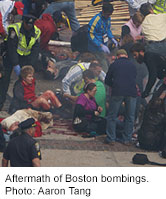- Could Your Grocery Store Meat Be Causing Recurring UTIs?
- Are You Making This Expensive Thermostat Error This Winter?
- Recognizing the Signs of Hypothyroidism
- 10 Strategies to Overcome Insomnia
- Could Artificial Sweeteners Be Aging the Brain Faster?
- Techniques for Soothing Your Nervous System
- Does the Water in Your House Smell Funny? Here’s Why
- Can a Daily Dose of Apple Cider Vinegar Actually Aid Weight Loss?
- 6 Health Beverages That Can Actually Spike Your Blood Sugar
- Treatment Options for Social Anxiety Disorder
Boston Marathon Bombing’s Legacy of Hearing Damage

Many people suffered long-term ear and hearing problems after the Boston Marathon bombing on April 15, 2013, a new study finds.
The study included nearly 100 people who were treated for ear/hearing injuries after the two bomb blasts. All of them reported hearing loss or ringing in the ears (tinnitus).
Seventy-nine of the patients had initial hearing tests that were available for review, and these tests revealed hearing loss, the study found. Patients who were closest to the blasts and who had other significant injuries suffered ruptured eardrums, according to the researchers.
“Hearing, tinnitus and dizziness-related quality of life was found to be impaired in these patients,” study senior author Dr. Alicia Quesnel, an otologic surgeon at the Massachusetts Eye and Ear Infirmary and Harvard Medical School, said in an infirmary news release.
“Our conclusion is that blast-related ear injuries constitute a major source of ongoing morbidity following the bombings. Patient symptoms continue to evolve and many patients have ‘hidden hearing loss,’ which may not be apparent on routine hearing tests. There is a definite need for long-term follow-up assessments to ensure that patients receive appropriate testing and treatment,” Quesnel said.
The study was released online Nov. 14 and will be in the December print issue of the journal Otology & Neurotology.
More information
The U.S. Centers for Disease Control and Prevention explains how to prevent noise-induced hearing loss.
Source: HealthDay
Copyright © 2026 HealthDay. All rights reserved.










